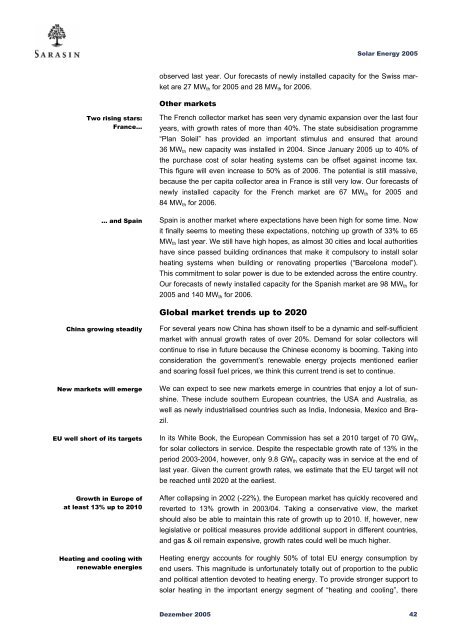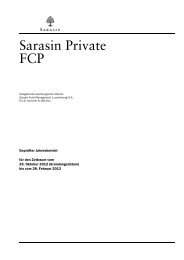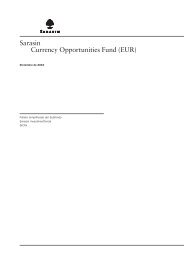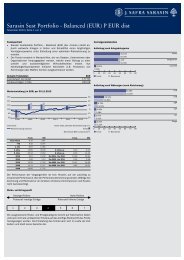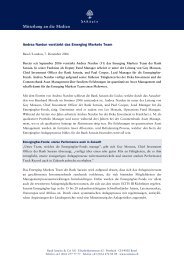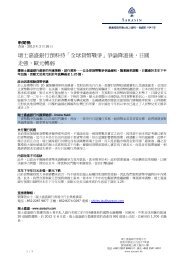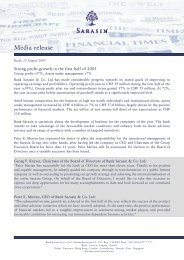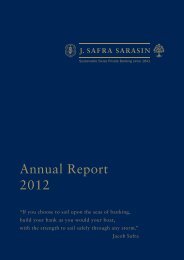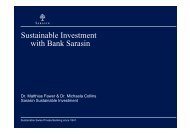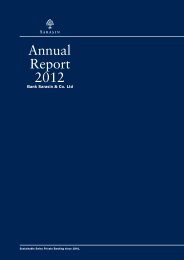Sustainability Report - Bank Sarasin-Alpen
Sustainability Report - Bank Sarasin-Alpen
Sustainability Report - Bank Sarasin-Alpen
You also want an ePaper? Increase the reach of your titles
YUMPU automatically turns print PDFs into web optimized ePapers that Google loves.
Solar Energy 2005<br />
observed last year. Our forecasts of newly installed capacity for the Swiss market<br />
are 27 MW th for 2005 and 28 MW th for 2006.<br />
Other markets<br />
Two rising stars:<br />
France…<br />
… and Spain<br />
The French collector market has seen very dynamic expansion over the last four<br />
years, with growth rates of more than 40%. The state subsidisation programme<br />
“Plan Soleil” has provided an important stimulus and ensured that around<br />
36 MW th new capacity was installed in 2004. Since January 2005 up to 40% of<br />
the purchase cost of solar heating systems can be offset against income tax.<br />
This figure will even increase to 50% as of 2006. The potential is still massive,<br />
because the per capita collector area in France is still very low. Our forecasts of<br />
newly installed capacity for the French market are 67 MW th for 2005 and<br />
84 MW th for 2006.<br />
Spain is another market where expectations have been high for some time. Now<br />
it finally seems to meeting these expectations, notching up growth of 33% to 65<br />
MW th last year. We still have high hopes, as almost 30 cities and local authorities<br />
have since passed building ordinances that make it compulsory to install solar<br />
heating systems when building or renovating properties (“Barcelona model”).<br />
This commitment to solar power is due to be extended across the entire country.<br />
Our forecasts of newly installed capacity for the Spanish market are 98 MW th for<br />
2005 and 140 MW th for 2006.<br />
Global market trends up to 2020<br />
China growing steadily<br />
New markets will emerge<br />
For several years now China has shown itself to be a dynamic and self-sufficient<br />
market with annual growth rates of over 20%. Demand for solar collectors will<br />
continue to rise in future because the Chinese economy is booming. Taking into<br />
consideration the government’s renewable energy projects mentioned earlier<br />
and soaring fossil fuel prices, we think this current trend is set to continue.<br />
We can expect to see new markets emerge in countries that enjoy a lot of sunshine.<br />
These include southern European countries, the USA and Australia, as<br />
well as newly industrialised countries such as India, Indonesia, Mexico and Brazil.<br />
EU well short of its targets<br />
Growth in Europe of<br />
at least 13% up to 2010<br />
Heating and cooling with<br />
renewable energies<br />
In its White Book, the European Commission has set a 2010 target of 70 GW th<br />
for solar collectors in service. Despite the respectable growth rate of 13% in the<br />
period 2003-2004, however, only 9.8 GW th capacity was in service at the end of<br />
last year. Given the current growth rates, we estimate that the EU target will not<br />
be reached until 2020 at the earliest.<br />
After collapsing in 2002 (-22%), the European market has quickly recovered and<br />
reverted to 13% growth in 2003/04. Taking a conservative view, the market<br />
should also be able to maintain this rate of growth up to 2010. If, however, new<br />
legislative or political measures provide additional support in different countries,<br />
and gas & oil remain expensive, growth rates could well be much higher.<br />
Heating energy accounts for roughly 50% of total EU energy consumption by<br />
end users. This magnitude is unfortunately totally out of proportion to the public<br />
and political attention devoted to heating energy. To provide stronger support to<br />
solar heating in the important energy segment of “heating and cooling”, there<br />
Dezember 2005 42


